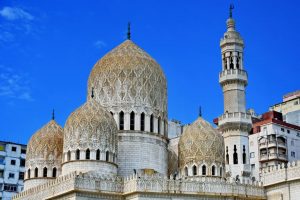
Discover the wonders of Egypt
The Gods of Ancient Egypt were integral to the lives of the people. They shaped their understanding of the world, the cosmos, and the afterlife. These deities, who often had both human and animal characteristics, represented various forces of nature, human emotions, and abstract concepts. Ancient Egyptians built massive temples, monuments, and tombs to honor these gods. They performed elaborate rituals and made offerings to gain their favor.
Ra, the sun god, was one of the most important deities. Ancient Egyptians believed he created the universe and all living things. They believed he sailed across the sky in his solar barge during the day, bringing light to the world. At night, he traveled through the underworld to fight the serpent Apep to ensure the sun would rise again. Pharaohs had an association with Ra to legitimize their rule.
Amun, a local deity from Thebes, rose to prominence during the New Kingdom. His name means “the hidden one,” and he was often depicted with a tall crown that had two plumes. He was known as the king of the gods. Later, Egyptians combined him with the sun god to become Amun-Ra, creating a powerful cult.
Osiris ruled as the god of the afterlife, the underworld, and rebirth. Egyptians believed that he was a mythical king who brought civilization and agriculture to the people. His brother, Seth, murdered him, but his wife, Isis, resurrected him. As a result, Osiris became the ruler of the underworld and the judge of the dead.
Anubis, the jackal-headed god, guided souls through the underworld as the god of mummification and the afterlife. He also oversaw the “Weighing of the Heart” ceremony. During this ceremony, he weighed a person’s heart against the feather of Ma’at. If the heart was lighter than the feather, the person was allowed into the eternal realm.
Horus was the god of the sky and kingship. He was the son of Isis and Osiris. His eye, the Eye of Horus, was a powerful symbol of protection and royal power. Pharaohs considered themselves the living embodiment of Horus on Earth.
Thoth was the god of writing, knowledge, wisdom, and the moon. He often appeared with the head of an ibis or a baboon. Egyptians credited him with inventing hieroglyphs and believed that he was the scribe of the gods.
Seth was the god of chaos, deserts, storms, and violence. He was known for his conflict with Horus and his role in the myth of Osiris. Although he was a destructive force, he also protected Ra from the serpent Apep, which showed his complex nature.
How far in advance should I book my tour? We recommend booking as early as possible, especially for peak seasons, to ensure availability and secure the best price. Many tours can be booked up to 12 months in advance.
What is the typical group size for your tours? Our Top speciality is Private Tours. As for groups, group size vary by tour, but we generally keep them small to ensure a personal and high-quality experience. The average is typically between 10-16 guests.
Are your tours private or shared group tours? We offer a mix of both. You can find this information clearly indicated on each individual tour page. Group tours are marked as such, and private options are always available.
How do I know if a specific departure date is available? For Private Tours, you do not need to, as they are available everyday. For group tours, you need to contact us.
What is included in the tour price? Inclusions vary per tour but often cover accommodation, transportation, professional guiding, and certain meals/activities & entrance fees. Detailed inclusions are listed on the itinerary section of each tour page.
Do I need to pay a deposit, and what payment methods do you accept? Yes, a deposit (25%) is required to confirm your booking. We accept major credit/debit cards (Visa, Mastercard, etc.) and bank transfers. Full details are in our Terms and Conditions.
Are there any hidden fees or surcharges? No. The price listed on the tour page is the final price, which is inclusive of all mandatory local taxes and fees. Any optional extras will be clearly noted.
What is your cancellation and refund policy? Our policy is clearly detailed in our Terms & Conditions. The amount refunded depends on how far in advance of the start date you cancel. We recommend travel insurance for maximum protection.
Is the destination safe for tourists? Travel safety is our top priority. We closely monitor government advisories and take all necessary precautions. We only operate in areas deemed safe and utilize experienced local guides for maximum security and peace of mind.
Do I need a visa to travel to the destination? Visa requirements vary based on your nationality and the destination. We advise all travelers to check with their country’s embassy or consulate for the most current entry requirements well before departure.
What sort of hotels/accommodation are used? We generally use high-quality, centrally located 4- or 5-star hotels (or the local equivalent). Specific hotel names or classification examples are listed on the individual tour pages.
What should I pack for my tour? A detailed packing list, specific to the tour’s climate and activities, is provided upon booking. Generally, comfortable walking shoes, layers of clothing, and sun protection are a must.
Can I customize a tour or create my own itinerary? Absolutely. If our packages don’t fit your needs, you can work with our travel experts to customize any tour or build a fully private, custom itinerary. Contact us to start planning.
What support is available if I have a problem during the tour? You will have 24/7 access to our dedicated local support team and your tour guide for any emergencies, changes, or issues that may arise during your trip.